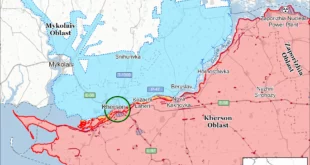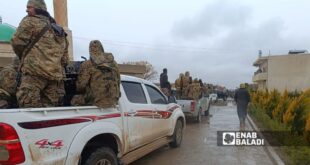A September deadline set to disarm the groups will “not be extended in any way.”
Iran warned Monday that it would not extend a September deadline for Iraq to disarm and evacuate Iranian Kurdish opposition groups based in camps within Iraqi territory, calling their presence a “dark stain” on otherwise friendly relations and raising fears of further Iranian attacks. Foreign Ministry spokesperson Nasser Kaanani said a Sept. 19 deadline set for disarming the groups would “not be extended in any way.”
In July, Iran threatened to use military force should Baghdad fail to comply with its demands as it did in September and November last year, striking Iranian Kurdish parties deep inside Iraqi Kurdistan with ballistic missiles and suicide drones and assassinating their leaders in urban centers.
“Our operations against these groups will definitely reoccur more severely” unless Iraq did as it was told, said Iran’s Chief of General Staff Mohammad Hossein Bagheri.
In March, Iran and Iraq signed a security agreement, the details of which were never formally disclosed. “Under the signed security deal, Iraq pledged it would not allow armed groups to use its territory in the Iraqi Kurdish region to launch any cross-border attacks on [neighboring] Iran,” said an Iraqi security official who attended the signing, Reuters reported.
The accord is believed to have included provisions that Iranian Kurdish fighters would be prevented from entering Iranian territory and moved away from the borders where they levy “taxes” on smugglers carrying alcohol, cigarettes and electronic goods into Iran. Iraqi forces would be deployed along the border, and Kurdish fighters would be disarmed, with some handed over to Iranian authorities, according to Iranian press reports. Some Iraqi officers are believed to now be stationed alongside Iraqi Kurdish peshmerga forces at certain points along the border.
Mohammed Nazif Qaderi, a senior member of the Kurdistan Democratic Party of Iran (KDPI), the biggest of the Iranian Kurdish opposition groups based in Iraqi Kurdistan, told Al-Monitor, “It is true that we have weapons. But we have never used them against the Iranian regime.” Local authorities have not sought to disarm them so far.
Another Iranian Kurdish politician speaking not for attribution said Iraqi Kurdish officials had already curtailed some of their activities, including moving their men away from their mountain outposts overlooking Iran. The politician maintained, however, that Iranian Kurdish forces would never surrender their weapons as they needed them to defend themselves and their families against Iranian aggression. “We promised KRG [Kurdistan Regional Government] authorities that we would not send our fighters into Iran and in fact, we haven’t,” he told Al-Monitor.
The ultimatum comes as Iranian authorities arrest scores of activists and pressure its citizens not to resume anti-government protests around the anniversary of the nationwide demonstrations that erupted a year ago over the death in police custody of Mahsa Amini, an Iranian Kurdish woman who allegedly breached the Islamic Republic’s dress code. At least 537 people were killed and 22,000 arrested as security forces crushed the unrest, according to international rights groups.
Iranian authorities pointed the finger of blame at “Kurdish terrorists” acting purportedly at the behest of malign foreign powers.
Iranian Kurdish leaders say they are being scapegoated as part of the regime’s bid to deflect attention from the real causes of the protests, namely the chronic lack of economic opportunity and freedom, which remain unresolved.
That said, Iran — like its regional rival Turkey — has historically been at odds with its large Kurdish minority, with the KDPI and Komala, a left-wing Iranian Kurdish group, seizing control of large chunks of Iranian Kurdistan as the shah’s rule came crashing down in the late 1970s. Even before the mass protests, Iran periodically attacked its Kurdish foes inside Iraq, though unlike Turkey it does not have thousands of forces deployed inside Iraqi Kurdistan.
Although both the KDPI and Komala say they have no desire to secede from Iran, Tehran believes otherwise. “They are viewed as secessionist groups and as such are a serious threat to Iran’s national security,” said Hassan Ahmadian, a professor at Tehran University. “The potential of those groups importing arms or their ability to weaponize some of the demonstrations inside Iran using their position in Iraqi Kurdistan is considered the most important factor in dealing with them. Stopping that potential is the main thing, and the Iranians have been pressurizing Iraq and the KRG to stop harboring them,” Ahmadian told Al-Monitor.
Moreover, Iran is convinced that Israel is using the Kurdistan Region to destabilize its regime. In March 2022, the Iranian Revolutionary Guard Corps (IRGC) struck the home of Iraqi Kurdish oil czar Sheikh Baz Karim Barznji. The IRGC said in a statement that a “strategic center for conspiracy and mischiefs of the Zionists was targeted by powerful precision missiles fired by the [IRGC].” Erbil’s governor denied the presence of Israeli agents.
Enforcing the alleged provisions of the deal would necessarily fall principally on the KRG, as the central government in Baghdad likes to point out. The KDP — the prevailing force in the KRG — collaborated with the late Iranian shah against the KDPI in exchange for his support against Baghdad.
In present times, the KDP is bitterly criticized by many Kurds for helping Turkey in its military campaign against the Kurdistan Workers Party (PKK). The group is fighting for Kurdish autonomy inside Turkey from its bases in Iraqi Kurdistan, and the Free Life Kurdistan Party (PJAK) is its Iranian arm. Turning against Iran’s Kurds yet again would blow a further hole in the KDP’s credibility. The KDPI has at least three bases inside KDP-controlled territory, but it’s generally accepted that the former does not pose any meaningful threat to Iran.
Nor does Komala, which has even fewer fighters and is based in areas controlled by the KDP’s coalition partner and biggest rival, the Patriotic Union of Kurdistan (PUK), and where Iran enjoys greater influence. “These Iranian groups had no impact on the protests,” said Sardar Aziz, an Iraqi Kurdish researcher who follows security affairs. He believes that Iran’s allegations are a foil for helping Iraq’s central government exert greater control over the Kurdistan Region in the aftermath of the Iraqi Kurds’ referendum on independence in 2017.
At the same time, while Iraqi Kurdish forces have the physical heft to disarm their Iranian brethren, “mounting public disenchantment with the ruling parties amid worsening economic conditions makes it that much more unlikely they would,” Aziz said.
 Eurasia Press & News
Eurasia Press & News




